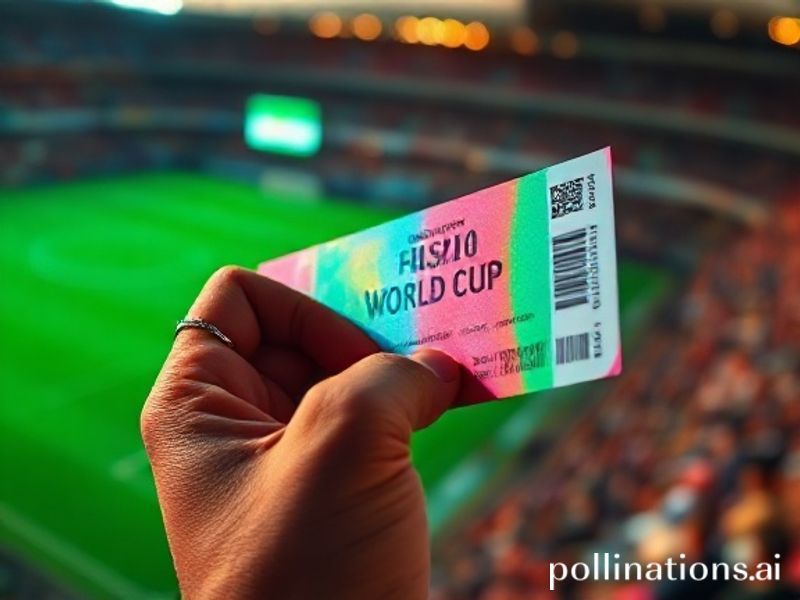FIFA World Cup Tickets: The Global Frenzy Where Bank Accounts Go to Die
Nothing says “global unity” quite like 3.5 million people simultaneously refreshing nine browser tabs at 3 a.m. local time, praying their credit card survives the international extortion known as the FIFA World Cup ticket portal. From Lagos to Lima, the ritual is identical: a cold sweat, a captcha that looks like abstract art, and the sudden realization that your entire life’s savings can be converted into 90 minutes of watching millionaires jog in formation.
For the uninitiated, FIFA’s ticketing system is a masterpiece of bureaucratic theater. First you register, proving you exist; then you queue, proving you have patience; finally you pay, proving you have no better use for €950. The process is so perfectly Kafkaesque that several Scandinavian nations have begun exporting it as performance art. Meanwhile, in the darker corners of the internet, resellers—sorry, “official hospitality partners”—offer the same seat at quintuple the price, plus a lukewarm canapé and the faint moral aftertaste of having funded someone’s yacht.
The global significance of this circus is not the match itself but the price of admission to the 21st-century pecking order. A ticket to the final in New York’s secondary market costs roughly the annual GDP per capita of Burundi, which is either a damning indictment of inequality or a bold new development strategy—hard to tell these days. In Mumbai, call-center workers pool salaries for group-stage scraps, while in Zurich, asset managers buy entire suites to impress clients who already own the broadcasting rights. It’s trickle-down economics wearing a neon bib.
Ticket geography tells its own sardonic story. Europeans gripe about the “random” draw that somehow favors anyone with a .de email address. Africans discover that direct flights from Dakar to the host city are mysteriously full, requiring a 47-hour odyssey via Reykjavik. Australians, ever the optimists, treat the airfare as part of the ticket price and arrive two weeks early to “acclimatize,” a euphemism for recovering from jet lag and cirrhosis. The lone North Korean fan is, as ever, photographed from the waist up, smiling on command.
And then there’s the carbon footprint, that inconvenient truth FIFA now offsets by promising to plant a tree for every holographic lanyard sold. One sapling per passenger works out to roughly a golf course’s worth of absolution, which will mature just in time to be chopped down for the 2046 World Cup souvenirs. Greta Thunberg retweeted the scheme with the single word “lol,” prompting FIFA’s social team to deploy thirty-three flame emojis and a picture of a smiling sloth.
Beneath the price tags and geopolitical grotesquerie lies a universal human itch: the need to belong to something louder than our own silence. A scalped ticket is a passport to collective delirium, where language barriers dissolve in reciprocal chants and mutual sunburn. For 120 minutes, stockbrokers and street vendors share the same oxygen and cholesterol levels. It’s touching, really—until the final whistle blows and the stadium empties faster than a crypto exchange.
Of course, the truly wise have already opted for the couch, 4K HDR, and a fridge within arm’s reach. They will watch slow-motion replays of the goal that cost $1,200 per second of real time and console themselves with the thought that at least their sofa has never required a visa. Yet even they, when the anthem hits and the camera pans across tear-streaked faces, will feel a small pang of envy for the suckers in the stands who paid for the privilege of losing their voices and probably their luggage.
In the end, FIFA World Cup tickets are less about football than about humanity’s endless talent for turning joy into a speculative asset. Buy early, sell late, repent at leisure. And if the queue crashes again, console yourself with the knowledge that somewhere in a glass tower, an executive is upgrading to platinum status on the back of your existential dread. The beautiful game, indeed.







